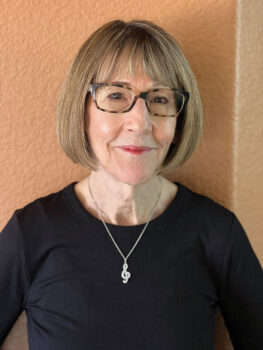
Susan Kravitz
Ken Marich
The program title is “This Is Your Brain on Music,” presented by Susan Kravitz. Her program will be held on Feb. 8 in the MountainView Ballroom East from 7 to 8:30 p.m. Seating is limited, so come early.
Susan was born in Long Island and grew up in the New York area. She earned a B.S. degree from Cornell University in psychology, sociology, and human development. Continuing her education, she earned a master’s degree in nursing and wellness from Adelphi University. Susan worked for 30 years at South Oaks Hospital in Amityville, N.Y. As a behavioral nurse, she discovered how to use her musical ability (singing, guitar, piano) as therapy with her patients. Susan and her husband retired to SaddleBrooke in 2009. Since retirement, it was natural for her to combine the aspects of her professional background with her musical passion to connect with people.
Susan Kravitz has been a popular Institute for Learning in Retirement (ILR) Instructor for eight years. On arrival in SaddleBrooke, she brought her love of singing folk music and blues and American history to create musicology courses that explored the relationship between history, culture, and song. Most recently, she has combined her professional background in behavioral health to create courses that deepen our understanding of how the brain responds to music. Her courses combine brain science with the art of music, exploring how advances in neuroscience enlighten us as to how and why music can enrich our lives in so many ways. Music helps the brain heal, as in the story of Gabby Giffords. Rhythms of music promote physical wellness through movement, and music is a social lubricant. People who sing together formally or informally develop closer connections with one another and become more open to new social connections. Songs teach us history, can make us laugh, cry, and increase our capacity for empathy. Songs document our own personal history, because we easily remember those that were associated with important celebrations, milestones, and crucial developmental periods in our lives. We know the brain is not binary, but a marvelous neural network of connections that explain our capacity for imagination, creativity, and empathy. Her courses use music videos and Susan’s live performances accompanied by guitar and piano. She calls it “edutainment.” The brain remembers and learns better when music is involved, because enjoyment enhances memory.
